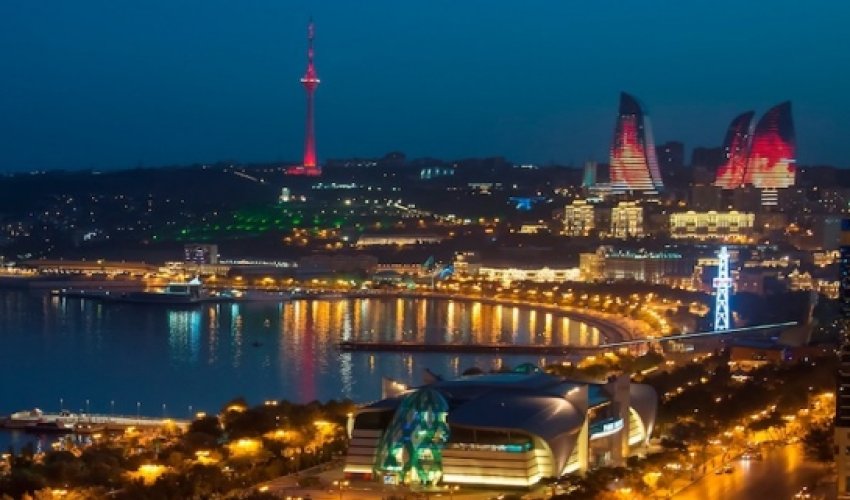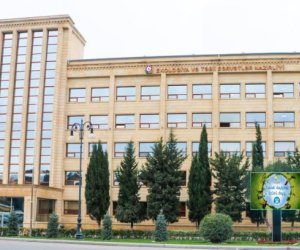Mindfulness, the art of diplomacy, and the prettiest city you don’t know

First, however, let’s look at my own patellar reflex. I was invited last fall to Azerbaijan to attend an international humanitarian forum and for all of my liberal leanings, I was scared. Other than a day in Istanbul (where a kind man ran after me because I paid too much for my street pretzel), I had never spent substantial time in a Muslim-majority country. As a child of a Jewish lobbyist and a Catholic advice columnist, how could I be fearful of a country based on its religious predominance? Yet there it was: my xenophobia.
So I asked around to those of my friends who were familiar with Azerbaijan: would I have to wear a hijab? Was I allowed to speak to men without being initially addressed? Would I be safe as an American woman in a Muslim country? These friends laughed at me and said, “You will love Baku [the capitol]. It’s the prettiest, most sophisticated city you’ve never heard of.” So I practiced my mindfulness, acknowledged my fears, and recognized that a fear is not a fact and I would have to judge this country based on my own contextual experience.
Initially, my fears were amplified when I went to the gate at Frankfurt Airport and I was one of three women waiting to board the flight to Baku. Was I stared at? You betcha. So I clung to my boyfriend and looked at my newspaper, as if I could actually focus on the print. Eventually, I used my mindfulness to eschew my current androphobia; perhaps the gentlemen at the gate were simply appreciating my “zaftig” good looks as opposed to resenting my obvious American origins. If nothing else, I soon became inured to their gazes and absorbed in an article about Nazi art thieves whose wares had recently been discovered in German warehouses.
Upon landing, I had expected soldiers with machine guns, but instead was presented with a real “Dorothy” moment, i.e., “Toto, we’re not in Denver anymore.” Baku was illuminated by modernist exhibit lighting on a backdrop of the new, turn of the century and ancient buildings one would expect in any older European city. We were escorted by young men and women to a VIP building that rivaled the lobby of the Four Seasons in which to wait. It was here that I was stunned by my own venustraphobia: I have never seen such a good looking group of people in my life, and I don’t mean the guests. Dark features, olive skin, and noses akin to a cross between those of Greek and Roman gods. Now, don’t let your hyperboliphobic tendencies interfere with comprehending my description: Azeris are damn fine looking people.
Being the typical American, all this beauty made me suspicious. Did they hold a beauty contest where the winners could meet the attendees of the Humanitarian Forum? That would be kind of creepy but faced with such beauty, I wondered. But then, as we were shuttled to our hotel and were approached by several other Azeris, I realized they just won out at the gene pool.
Baku is located on the Caspian Sea. Whether you see a little oil upon water as attractive or concerning, the boardwalk is as romantic a place to walk as any in rival cities of Paris, Rome, and New York. Baku Boulevard at night has light shows on the facades of skyscrapers that celebrate the country’s independence from the Soviet Union. It was such a background behind the boardwalk’s pier that my boyfriend proposed to me and became my fiancé. Now it was impossible for me to be afraid of this beautiful city and its inhabitants.
It is particularly ironic that I was nervous to be in a country that has celebrated and included its ethnic identities for centuries. Both sides of my ancestry have been welcomed in Azerbaijan. There are Mountain Jews who live in Guba, who live side by side with their Muslim neighbors and in fact are aided in renovating historic homes and synagogues in the region. Catholics are not threatened nor are the many religious and ethnic sects in Azerbaijan. I am not sure, in the west or the east, that there is a country that can compete with such tolerance of its own people.
As a psychiatric nurse practitioner and doctorate of nursing, I have yet to struggle with lyssophobia. However, my knack for prejudging this country extended to its treatment of psychiatric patients: I expected a cross between The Bell Jar and One Flew Over the Cuckoo’s Nest, only with a Russian accent. Ambitious to “teach and lead” the psychiatric professionals into the American way of unconditional positive regard, I slammed straight into the Ismayilovs, father and son leaders of the psychiatric treatment community.
Dr. Nadir Ismayilov, president of the Azerbaijan Psychiatric Society, and Dr. Fuad Ismayilov, Director of National Mental Health Centre, graciously met with me and showed me their way of doing things – and I was knocked back onto my supercilious “tuchus.” The outpatient teaching and treatment facility I visited was state-of-the-art and I took home the desire to copy its “wishing tree” that the clients use to be mindful of their present desires. The inpatient facility had remnants of the Soviet past, but showed the overwhelming effort to instead make it the Azeri future of psychiatric treatment. I left the new buildings of the inpatient campus wishing American public facilities could one day measure up.
Despite my crowing, is Azerbaijan a perfect nation? My answer is that it is a new nation. It has the opportunity, with its oil and natural gas wealth, to accentuate that which we love about a country but disregard those things that cultivated oppression. The U.S.’s recent condemnation of last fall’s elections was short-sighted and reflected ignorance of the context of the elections and an emerging democracy. Azerbaijan is an important ally both for its sources of natural gas and oil, Muslim tolerance and Western values. Shouldn’t we spend more time strengthening our relationship with this nation rather than nitpicking its growing pains?
One visit to Azerbaijan made me realize that this country is not only beautiful for its external aesthetics but also for the tolerance within. The people are sophisticated and the elite are better dressers than I have seen in any western capitol city. The youth are eager to learn about American ways, but also to integrate their own values and tech-savvy strengths. The townspeople in the less populated regions are eager and welcoming.
So back to mindfulness: My tour of Azerbaijan and particularly the time I spent in the capitol city Baku helped me conclude that what we fear is simply the unknown. If we mindfully enter new experiences being honest, open and willing, we will learn to embrace our Muslim, Christian, Jewish, Buddhist, etc. brothers and sisters, one country at a time.
About the author: Dr. Mallory Moss received her doctorate at the University of Colorado and is a Board Certified Nurse Practitioner of Psychiatry. Dr. Moss is also a clinical nurse specialist in psychiatric nursing and received her Master of Science (MSN) at the University of Colorado and Bachelor Degree in psychology at UCLA. While at UCLA, Dr. Moss worked with Dr. Edwin Shneidman on the psychology of death and suicide and with Dr. Leo Kuper on genocide in the Sudan. Dr. Moss is currently serves at Colorado’s prestigious AspenPointe.
ANN.Az




































 Photo
Photo 



 Video
Video 

